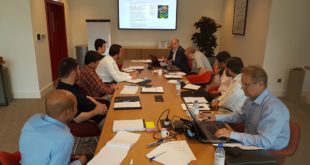TRAINING WORKSHOP ON GEOSPATIAL INFORMATION AND AGRICULTURAL STATISTICS Methodology and Applications on the Integral use of Geospatial Data to support Improved Agricultural Monitoring through Area Frame development and Multiphase sampling for the Sustainable Monitoring of Agricultural Land in Afghanistan. Dubai, United Arab Emirates [huge_it_slider id=”1″] Course Goals: To train resources 6 persons of MAIL in approaches for the operational integration of Geospatial data for crop area estimation for Rice and Cotton. Objectives of Training: The Food and Agriculture Organization of the United Nations (FAO) is collaborating with the RASIL under the project “Strengthening Afghanistan Institutions’ capacity for the Assessment of Agriculture Production …
Read More »Project Management Cycle with focus on Project design and proposal writing
Overview This course provides an in-depth knowledge and hands-on experience on project management cycle. Its focus will lie in identification of needs through various assessment models, planning phases and methodologies, project implementation and its challenges and operational modalities. The course will also provide participants with knowledge on monitoring and evaluation of activities/outputs/outcomes in following the international standard of results-based management and financial management, including budget planning, resource mobilization, financial expenditures and reporting for better accountability and transparency . Training methodology The course will be delivered through a mix of theoretical and practical approaches. Participants will be presented with methods …
Read More »Team Building Skills
Overview This training provides advanced knowledge and hands-on practical exercises on team building for effective results. It equips managers and supervisors with the adequate knowledge and skills to define their team’s objective, identify the team dynamics, explore mechanisms for team members’ alliances and instate a year-round cycle to sustain team building thriving for better results. Training methodology The course gives participants a hands-on experience by presenting them with techniques, which they will be able to apply in their respective work places. As such it will require an active participation in group exercises, through which they will learn how to …
Read More »Skills of effective communication
Overview Communication in humanitarian settings is key to ensuring effective key programme implementation and beneficiaries’ satisfaction. Communication is of central value in humanitarian programming as it is the main mode of interaction between the different actors. The course provides the basics and essentials of communication principles applicable in the humanitarian and development fields. It introduces pathways, tools and objectives of internal and external communication including media and public information analysis and management. It includes training on external communication channels such as social media, public information, public outreach, public speaking, newsletters, and advocacy in addition to internal communication channels and related …
Read More »Humanitarian Principles and Practices
Overview The crash course provides a general introduction to the humanitarian response principles and practices. It aims at better equipping humanitarian workers with general knowledge of the humanitarian programme cycle, International Human Rights Law and International Humanitarian Law, the humanitarian cluster coordination and operating system during and post emergencies. Presentation of theories is supported by an overview of case studies from crisis countries around the world. Training methodology The course includes theoretical overview coupled with real life examples of how various theories are applied in real-life contexts. This will be achieved by using case studies and video clips, illustrating …
Read More »Management and Leadership Skills
Overview Effective humanitarian response and development programming require effective leadership. The ability to lead teams and organizations is an essential skill to improve team and organizational performance. The course will provide participants with an overview of leadership models and how they can be applied in humanitarian work. It will also look at developing essential skills of good manager, able to understand the team dynamics, engage and motivate their teams and minimize conflicts. The course will allow participants to identify and begin to practice effective leadership skills. Training methodology The course is based on a participatory, active learning approach, with …
Read More »Stress management
Overview This course will enable participants to consider the management of work-related stress at an individual and organizational level, with particular focus on the importance of stress management in humanitarian contexts. The course will help participants to develop and implement effective strategies to identify stressors and prevent, minimize and manage stress. The course will give opportunity for participants to apply its content in practical scenarios, and will equip them with stress management techniques. Training methodology The course will have a practical focus, built upon the theoretical knowledge of stress and stressors. participants will be presented with case studies form …
Read More »Monitoring and Evaluation
Overview Monitoring and evaluation are essential activities ensuring project’s success, including in a development or humanitarian response setting, where there exists continuous need for feeding the results back to stakeholders and beneficiaries. The course will emphasize practical application of basic and essential principles of program monitoring and evaluation. Participants will be introduced to the key methods and tools used in monitoring and evaluation of interventions in humanitarian and development contexts. Training methodology The course will combine theoretical and practical approaches to learning. The participants will be introduced to the M&E concept in humanitarian setting through presentations, case studies and …
Read More »Managing Projects and People in Emergencies
Overview The course seeks to introduce participants to the Results-Based Management (RBM) concept and its application in project management. RBM focuses on the performance and achievement of objectives and is the dominant management strategy in use. Participants will learn about project planning and activities programming steps. The main tool used in this is the logical framework, which provides a structured model for identifying expected results as well as the activities and inputs needed to accomplish them. The course also provides additional techniques and tools to identify stakeholders, analyze problems, define objectives in line with population’s needs and program human, financial …
Read More »Disaster Risk Reduction
Overview The number of natural and human-made disasters has increased drastically in the past decade. While some of them cannot be at this stage prevented, their impact on populations can be controlled and reduced through disaster risk reduction (DRR) practices. The course will focus on main concepts and practices of reducing disaster risks through analysis and management of disasters’ factors, i.e. reducing exposure, minimizing vulnerabilities and improving preparedness. The course will allow participants to understand global approaches to DRR, including International Strategy for Disaster Reduction (ISDR) system. Training methodology The course will blend the theory of disaster risk reduction …
Read More » Welcome to Rasil We strive for excellence
Welcome to Rasil We strive for excellence









